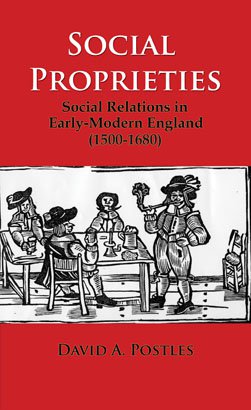
About the Author
David Postles is University Fellow in the Department of English at the University of Leicester. For many years, he was Marc Fitch Research Fellow in the School of Historical Studies in the same university. He was formerly a medievalist with a strong publication list in that area, but recently he has converted to early-modern English history, publishing in the Journal of Ecclesiastical History, in Social History, and in the Journal of Historical Sociology.
SOCIAL PROPRIETIES: Social Relations in Early-Modern England
David A. PostlesNew Academia Publishing, 2006
204 Pages
ISBN 0-9767042-9-3 Paperback
For BULK ORDERS, order directly from New Academia Publishing.
Queries: orders@newacademia.com
About the Author
David Postles is University Fellow in the Department of English at the University of Leicester. For many years, he was Marc Fitch Research Fellow in the School of Historical Studies in the same university. He was formerly a medievalist with a strong publication list in that area, but recently he has converted to early-modern English history, publishing in the Journal of Ecclesiastical History, in Social History, and in the Journal of Historical Sociology.
About the book
This book combines theater and life in an attempt to consider how people interacted in face-to-face situations in early-modern England, and to examine the wider implications of those relationships for social organization. The research behind the text is interdisciplinary: it draws on mid-Tudor comedies, the City comedies, and early-Stuart plays, illustrating how the dramatic realism of those playwrights interrelates to the real social world.
Praise
“It’s a novel study of an intrinsically interesting subject, drawn from sources never before systematically explored by social historians.”
– Margo Todd, Walter H. Annenberg Professor of British History, University of Pennsylvania.
“David Postles was able to successfully combine research across the disciplinary boundaries between social history and literary and sociological analysis…. The result is a subtle and multivalent study of human conduct, social position, and the ways in which early-modern subjects sought to fashion their own identities—and were in turn fashioned by others—through the language of social exchange.”
– Greg Walker, Professor of Early-Modern Literature and Culture, University of Leicester.
“This book promises to be simultaneously a significant contribution to interdisciplinary scholarship—across the fields of history, literature, and the social sciences—and a work of abiding human interest.”
– Charles Phythian-Adams, Professor Emeritus of English Local History, University of Leicester.
“The idea of this book to recreate the social structure from the way persons addressed one another and the variety of social descriptors employed is long overdue.”
– Richard Smith, FBA Professor of Historical Demography, Cambridge University.





 Coming Soon
Coming Soon Awards
Awards